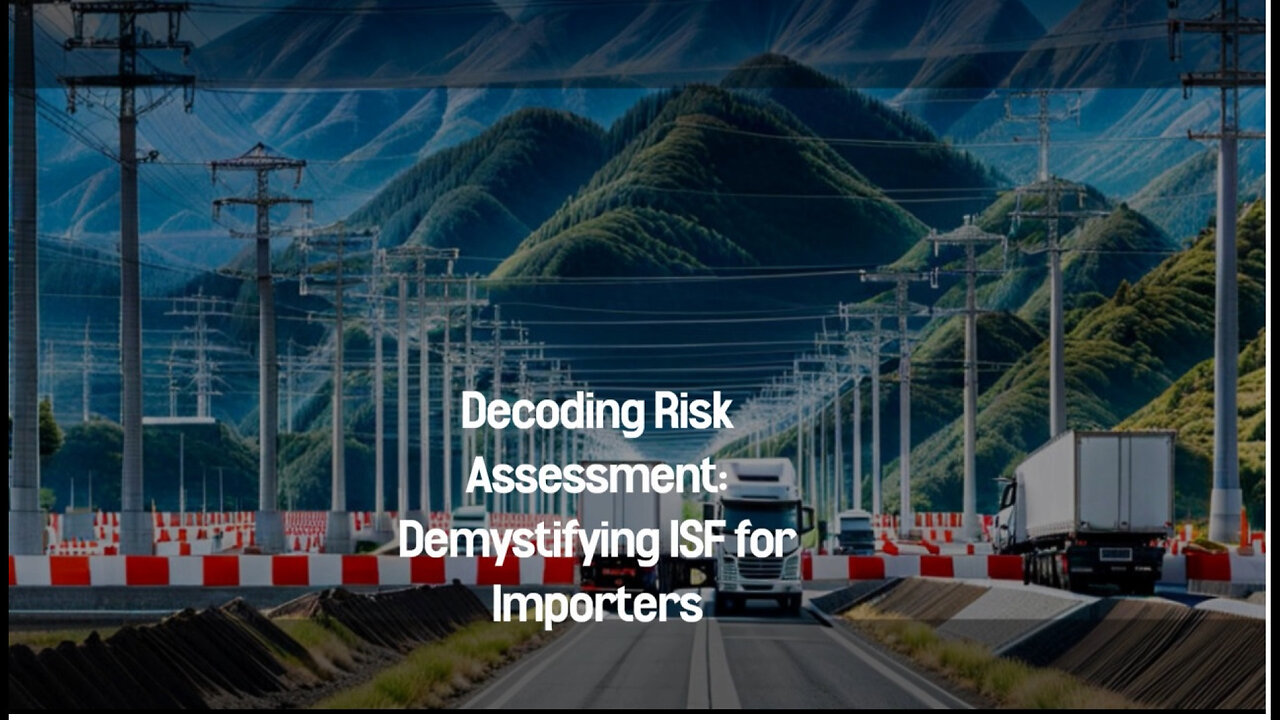Premium Only Content

Crucial Steps: Risk Assessment in Importer Security Filing
ISF Depot // 661-246-8217 // customs@isfdepot.com // www.isfdepot.com
This response deep dives into the concept of risk assessment in Importer Security Filing (ISF) and its importance in ensuring the safety of US borders, preventing illegal activities, and enforcing trade laws and regulations. The role of risk assessment is discussed, including the analysis of ISF data and other intelligence information to identify potential security risks. Factors considered in the risk assessment process, such as the country of origin, the nature of the goods, and the parties involved in the transaction, are explored. The actions taken by Customs and Border Protection based on the risk assessment results are also highlighted. The significance of accurate and timely information provided by importers in facilitating the risk assessment process and reducing delays in cargo clearance is emphasized. Overall, risk assessment plays a critical role in the Importer Security Filing process and contributes to the safety and efficiency of the trade ecosystem.
#usimportbond #isfcustomsbroker #uscustomsclearing #isfentry
Video Disclaimer Here: This tutorial is independent and not affiliated with any US governmental entities.
00:25 - Importer Security Filing (ISF) is a mandatory requirement by U.S.
Customs and Border Protection for all import shipments entering the United States, requiring specific information about the cargo prior to arrival.
00:48 - Risk assessment in ISF plays a crucial role in evaluating security threats posed by inbound cargo, involving factors like country of origin, nature of goods, and transaction parties.
01:26 - Factors considered in risk assessment include the country of origin, nature of goods (e.g., hazardous materials), and compliance record of importers, carriers, and stakeholders.
02:27 - After risk assessment, Customs and Border Protection may take actions like clearing cargo for transportation or conducting inspections to ensure compliance, highlighting the importance of accurate information for smoother trade operations and enhanced supply chain efficiency.
-
 LIVE
LIVE
TimcastIRL
2 hours agoDemocrats SHUT DOWN Congress Blocking Censure Of Al Green, OBSTRUCT House w/Joe Redden | Timcast IRL
19,124 watching -
 1:03:27
1:03:27
Glenn Greenwald
5 hours agoUK Pressures Apple to Break Encryption in Major Privacy Clash; How Dems Can Win Back the Working Class: With Former Bernie Sanders Campaign Manager Faiz Shakir | SYSTEM UPDATE #419
37.8K42 -
 47:39
47:39
Michael Franzese
4 hours agoJewelry King Trax NYC EXPOSES How the Powerful Steal from You
45.3K8 -
 LIVE
LIVE
Slightly Offensive
3 hours ago $2.86 earnedCandace REDPILLS the Masses in BOMBSHELL Theo Von Interview | Guest: Shane Cashman
1,166 watching -
 LIVE
LIVE
megimu32
3 hours agoON THE SUBJECT: IRL Streamers Attacked & Nostalgic Animal Movies That Made Us Cry
589 watching -
 1:00:54
1:00:54
The Tom Renz Show
7 hours agoMore Epstein/FBI, a Scary Trade War, & the Dem Echo Chamber
7.49K1 -
 40:43
40:43
Kimberly Guilfoyle
8 hours agoDems Double Down on Delusion-Why? Live with Tony Kinnett & Bo French | Ep.202
77.8K34 -
 1:28:42
1:28:42
Redacted News
6 hours agoBREAKING! SOMETHING BIG IS HAPPENING IN EUROPE ALL OUT WAR IS COMING AGAINST RUSSIA, TRUMP FURIOUS
121K282 -
 47:50
47:50
Candace Show Podcast
6 hours agoBREAKING: Judge Makes Statement Regarding Taylor Swift's Text Messages. | Candace Ep 155
113K112 -
 1:14:23
1:14:23
Josh Pate's College Football Show
3 hours ago $0.29 earnedCFB’s Most Hated Teams | FSU & Clemson Future | Big Ten Win Totals | Star Rankings Overrated?
14.5K